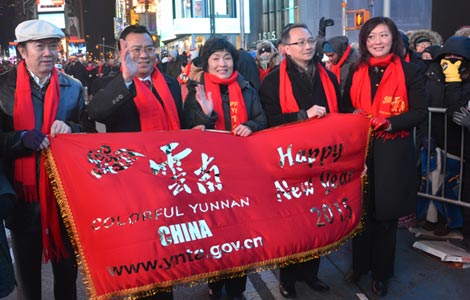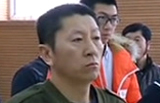Hunting down financial suspects hiding overseas
Updated: 2014-12-31 07:44
By Zhang Yan(China Daily)
|
||||||||
'Fox Hunt' highlights successes of broader anti-graft drive, butmore work needed
In April 2012, Wang Guoqiang, former Party chief of Fengcheng, Liaoning province, obtained a passport and visa to attend his daughter's graduation ceremony in the United States.
But he was apparently not planning to return home. The senior official had transferred assets worth 200million yuan ($32.5million) out of the country before leaving for the US with his wife, according to the provincial commission for discipline inspection.
More than two years later, on Dec 23, following joint operations between Chinese and US authorities, Wang returned to China and surrendered.
The Central Commission for Discipline Inspection of the Communist Party of China, the country's top anti-graft agency, is now investigating Wang, who is suspected of taking bribes and embezzling public funds.
Wang is one of many officials in the past few years who had fled overseas, including to the US, Canada and Europe, transferring illegally obtained assets through money laundering and underground banks.
Between 1990 and 2011, 18,000 corrupt officials fled, taking up to 800 billion yuan with them, according to the Chinese Academy of Social Sciences.
Through last year, more than 150 corrupt officials were still at large in the US alone, holding billions of illegally transferred yuan, the Ministry of Public Security said.
Wang is one of the 500 fugitives of financial crimes who have been brought back from60 countries and regions by Chinese law enforcement authorities to stand trial after the launch of the "Fox Hunt 2014" campaign, which was initiated in July to nab suspects overseas.
The six-month drive, supported by more than 40 special inspection teams, has been a major breakthrough in the country's wide-ranging crackdown on corruption, which has reared its head not just at home but also abroad.
"Most of the suspects have been transferred to prosecuting departments to face trial," Liu Dong, deputy director of the ministry's financial crimes investigation bureau, told China Daily. "The courts will also decide how the assets seized in the cases should be handled after issuing verdicts."
Officers have netted many fugitives who fled to Southeast Asian and African countries, Liu said. For the first time, many suspects have also been brought back from places like Fiji and Spain. The US, Canada and Australia are also cooperating with China in the hunt for suspects and assets, he said.
The Chinese authorities will continue to work with their foreign counterparts on the exchange of information to rein in suspects and deal with seized assets appropriately, said YouXiaochen, a senior police officer who took part in the arrests.
But practical challenges remain.
"Legal barriers and differences in legal procedures "make it difficult to confiscate assets. Judicial departments in some Western countries like the US and Australia seem "prejudiced against the Chinese legal system and its procedures", Liu said, adding that they mistakenly believe that "Chinese judicial officers will torture the suspects and prosecute the mun fairly".
Still, with the anti-graft drive a top priority, the authorities are pushing to overcome obstacles and strengthen cooperation to bring in the fugitives and seize stolen assets.
At the Asia-Pacific Economic Cooperation meeting in Beijing in November, leaders of the APEC economies agreed to set up a regional law enforcement cooperation network to target corrupt officials.
About 30 law enforcement officers from the APEC economies participated in a training session held Dec 17-19 in Beijing, where 14 leading specialists from home and abroad gave 11 lectures covering judicial assistance, repatriation of fugitives and the return of assets. They also highlighted successful cases and practical challenges.
The APEC anti-graft agreement will offer a platform for China and other countries to share intelligence, discuss cases and make plans for arrests, said Huang Feng, a law professor at Beijing Normal University.
"Above all, other countries will come to understand our laws and legal procedures, and be willing to cooperate with us to capture the fugitives and fight the money-laundering," he said.
Liu said the effort will not stop. "Although 'Fox Hunt' has temporarily concluded, we will continue to hunt fugitives in foreign countries," he said.
His team will "seize the opportunity to build up resources with judicial departments in other countries and expand channels with them to bring more fugitives back to face trial".
"The priority is to collect the relevant evidence at home and enhance the attack on corrupt officials - to tighten supervision of 'naked officials' to prevent those suspected of graft from possibly escaping to avoid any punishment," said Dai Peng, director of the criminal investigation college at People's Public Security University of China. "Naked officials" are those who send their families to live abroad while they themselves remain in the country.
Heat at home
In China, corrupt officials have also been feeling the heat.
In January of last year, President Xi Jinping said the anti-graft authorities should go after both "flies" and "tigers" - meaning corrupt officials at every level, including senior ones.
At latest count, 61 officials at the provincial or ministerial level, or higher, have been placed under investigation, according to the Central Commission for Discipline Inspection.
Those include Zhou Yongkang, the former security chief; Xu Caihou, former vice-chairman of the People's Liberation Army; Su Rong, former vice-chairman of the Chinese People's Political Consultative Conference National Committee; and CPC Central Committee United Front Work Department head Ling Jihua.
"We have investigated a number of senior officials suspected of corruption - provincial and ministerial level or above - based on the tip offs provided by the central inspection teams," said Zhang Benping, deputy director of the Central Inspection Work Leading Group.
Based on the tip offs, the top anti-graft watchdog has investigated several high-ranking officials, including Bai Enpei, former Party chief of Yunnan province, and Wan Qingliang, former Party chief of Guangzhou, Guangdong province, Zhang said.
To boost the fight against corruption, the CCDI deployed teams on five rounds of inspections to 31 provinces and regions to gather information on suspects since November 2012, when the new leadership was elected.
Since March of this year, it has conducted three rounds of inspections. In early December, it sent inspectors to 13 central government ministries, agencies and companies, including the Ministry of Culture, Sinopec and China Unicom, to check the conduct of officials.
Between March and October, the central inspection teams found more than 400 cases of graft involving bureau-level officials in just three places - Tianjin municipality and Hainan and Shandong provinces.
Seventy-four senior directors of State-owned enterprises have also been probed so far this year. Those included China National Petroleum Corp's former chairman Jiang Jiemin; China Resources Group's former chairman Song Lin; and Xue Wandong, the former manager of a petroleum engineering technology subsidiary of Sinopec.
The CCDI has also set up a hotline, e-mail address and special mobile phone number to gather information from the public regarding corruption.
"The anti-graft inspectors have clear goals and will focus on investigating important leads on corrupt officials," said Chen Gang, a law professor at Renmin University of China. "They have tried to employ more convenient channels like short messages to motivate the public to offer information."
The CCDI will also open supervision offices, with teams-based permanently to cover all 140 central Party and State organs, Chen Wenqing, deputy secretary of the CCDI, said during an earlier online interview.
"Deploying inspection teams to all Party and government agencies will enhance regular supervisory capacity and help prevent and curb corruption at its root," he said.
The inspectors will first be deployed to seven government and Party bodies, including the CPC Central Committee's General Office, the General Office of the State Council, the Organization Department and the United Front Work Department.
Supervisors will also be sent to the National People's Congress, the National Committee of the Chinese People's Political Consultative Conference and the Publicity Department.
"The extension of supervision to all central Party and government agencies shows that the central government is adopting a zero-tolerance attitude toward corruption," said Pi Yijun, a law professor at China University of Political Science and Law. "The new measure will minimize the risk of corruption and prevent major cases from occurring in the future."
Thousands punished
The Party's Central Committee has put forward a set of clean governance rules - including requirements to lead a frugal life and cut expenses for government vehicles, receptions and overseas trips-that cover official behavior at all levels.
Between January and November, the disciplinary authorities punished more than 60,000 government officials for breaking the rules - twice the number of the previous year, CCDI figures show.
A typical case occurred in June, when the CCDI announced that Duan Xinhong, a prosecutor with the Linfen City People's Procuratorate in Shanxi province, had been sacked for accepting 52,400 yuan from 143 people during his father's funeral last November.
"Wewill enhance the at tack on corruption in some of the worst-hit sectors, including construction, land transfers and minerals, and curb graft by low-level officials and those who abuse their power by colluding with enterprises," the CCDI said.
Hong Daode, a law professor at China University of Political Science and Law, said that the increasing number of "tigers and flies" probed by the top anti-graft watchdog reflected the central government's determination to fight corruption.
The central authorities should also "promote a mechanism for officials to publicize their private property, including their bank savings and houses, and tighten supervision on 'naked officials' to prevent them from escaping abroad", he said.
"The anti-graft fight will become standard," Renmin's Chen Gang said. "After completing investigations within the Party, the disciplinary officers will immediately transfer officials suspected of corruption to the prosecuting departments to face trial."
zhangyan1@chinadaily.com.cn

|
A suspect surnamed Zhou is arrested by Colombian law enforcement officers as part of the efforts to boost cooperation between China and Colombia to combat corruption and crimes. Provided to China Daily |
|
Anti-corruption investigators work on the 'Fox Hunt 2014' campaign in Beijing's financial street in August. Provided to China Daily |
|
A special anti-graft investigation squad attached to the 'Fox Hunt 2014' campaign escorts four suspects to China from Malaysia on Oct 16. Provided to China Daily |
(China Daily 12/31/2014 page6)
- New Year's Eve celebration in Times Square
- Death toll from tropical storm rises to 35 in Philippines
- Female fighters in the battle against IS
- China launches frigate for Bangladesh navy
- Divers set to search for AirAsia wreckage after debris, bodies found
- Nurse becomes first Ebola victim diagnosed in Britain

 Happy New Year
Happy New Year
 Happy Yunnan Year from Times Square
Happy Yunnan Year from Times Square
 Let the celebration begin
Let the celebration begin
 New Year's Eve celebration in Times Square
New Year's Eve celebration in Times Square
 Creative colored drawings embrace New Year
Creative colored drawings embrace New Year
 2014 Top news events in China
2014 Top news events in China
 Ten breakthroughs of China's military diplomacy in 2014
Ten breakthroughs of China's military diplomacy in 2014
 Chongqing collective wedding applies for Guinness records
Chongqing collective wedding applies for Guinness records
Most Viewed
Editor's Picks

|

|

|

|

|

|
Today's Top News
Tmall Global's sales rose tenfold in 2014
Yunnan helps rock Times Square celebration
36 killed, 47 injured in Shanghai stampede
US sorghum exports to China hit 19-year high
China's Fosun buys US insurance market
NYC to rename streets for slain policemen
Shares of CNR, CSR surge after merger
Fosun to buy Meadowbrook Insurance for about $433m
US Weekly

|

|








